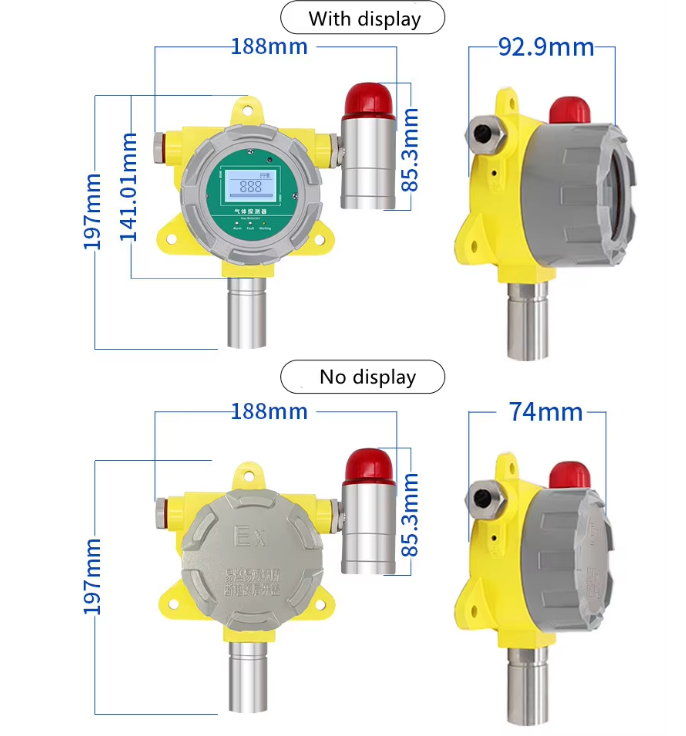Technologische Sicherheitsvorkehrungen – Explosionsgeschützte Gassensoren helfen Saudi-Arabiens petrochemischer und Bergbauindustrie, das Ziel der „Null-Unfälle“ zu erreichen
[Riad, 1. April 2025]Als wichtiger Akteur im globalen Energiesektor hat Saudi-Arabien bedeutende Investitionen in die industrielle Sicherheit getätigt und sich dabei insbesondere auf die Umsetzung vonExplosionsgeschützter GassensorDiese fortschrittliche Technologie wird mittlerweile in Öl- und Gasanlagen, Erdgasförderanlagen und im Bergbau weit verbreitet eingesetzt und verringert das Explosionsrisiko durch Leckagen brennbarer Gase erheblich. Diese Initiative ist essenziell für die Umsetzung der saudischen „Vision 2030“, die die digitale Transformation der Industrie des Landes zum Ziel hat.
1. Arbeitssicherheit: Die Lebensader der petrochemischen Industrie
Saudi-Arabien beherbergt den weltgrößten Ölkonzern Saudi Aramco, der strenge Überwachungsvorschriften für Gaslecks in seinen Raffinerien, Pipelines und Lagerstätten einhält. Herkömmliche Sensoren versagen oft in rauen Umgebungen mit hohen Temperaturen und Drücken. Im Gegensatz dazu haben die neuesten explosionsgeschützten Gassensoren bemerkenswerte Fortschritte erzielt, darunter:
- ATEX/IECEx-ZertifizierungDurch die Einhaltung internationaler Normen für Explosionsschutz sind diese Sensoren für den Einsatz in explosionsgefährdeten Bereichen der Zone 1 und Zone 2 geeignet.
- Mehrgasdetektion: Kann gleichzeitig Gase wie Methan (CH₄), Schwefelwasserstoff (H₂S), flüchtige organische Verbindungen (VOCs) und mehr überwachen.
BeispielIn der Industriestadt Jubail führte die Installation explosionsgeschützter Sensoren im Jahr 2023 zu einer bemerkenswerten Reduzierung der Gasleckvorfälle um 40 % im Vergleich zum Vorjahr.
2. Modernisierung der Energiewirtschaft: Intelligente Überwachung und vorausschauende Wartung
Die saudische Regierung integriert explosionsgeschützte Sensoren in eine IoT-Plattform (Internet der Dinge), um ein umfassendes Gasüberwachungsnetzwerk aufzubauen:
- FernüberwachungDie Datenübertragung erfolgt über 4G/5G-Netze an eine zentrale Leitstelle, wodurch eine sofortige Anomalieerkennung und automatische Warnmeldungen ermöglicht werden.
- Prädiktive Analysen: KI-Algorithmen verarbeiten historische Daten, um frühzeitig vor potenziellen Geräteausfällen oder Leckagerisiken zu warnen.
BeispielDie Saudi Basic Industries Corporation (SABIC) implementierte dieses System und konnte dadurch die Ausfallzeiten der Anlagen reduzieren und jährlich über 5 Millionen US-Dollar an Wartungskosten einsparen.
3. Politikförderung und Zusammenarbeit mit Unternehmen
- Nationale StrategieDie Vision 2030 Saudi-Arabiens schreibt vor, dass alle Industrieanlagen mit hohem Risiko bis 2027 auf intelligente Sicherheitsausrüstung umgerüstet werden müssen.
- Lokalisierte ProduktionSaudi Aramco ist Partnerschaften mit Honeywell und Bosch eingegangen, um Joint Ventures zu gründen, die Abhängigkeit von importierten Sensoren zu verringern und die lokale Fertigung zu fördern.
Zukunftsaussichten
Saudi-Arabien plant, den Einsatz explosionsgeschützter Gassensoren auf Zukunftsbranchen wie Wasserstoffenergie und Meerwasserentsalzung auszuweiten. Darüber hinaus möchte das Land den Golf-Kooperationsrat (GCC) zur Etablierung einheitlicher industrieller Sicherheitsstandards bewegen.
Experteneinblicke
„Explosionsgeschützte Sensoren sind nicht nur Sicherheitsinstrumente, sondern wesentliche Bestandteile der saudischen Industrie-4.0-Vision. Sie ermöglichen es petrochemischen Anlagen, das Ziel ‚Null Opfer‘ zu erreichen.“
— Dr. Ahmed Al-Farsi, Direktor des Forschungszentrums für Energiesicherheit an der König-Saud-Universität.
Für weitere Informationen
Für weitere Informationen zur Gassensortechnologie wenden Sie sich bitte an Honde Technology Co., LTD.
- E-Mail:info@hondetech.com
- Unternehmenswebsite:www.hondetechco.com
- Telefon+86-15210548582
Schlüsselwörter (SEO-Optimierung)
- Explosionsgeschützter Gassensor Saudi-Arabien
- Arbeitssicherheit in der Öl- und Gasindustrie
- ATEX-zertifizierter Gasdetektor
- IoT für Gefahrenbereiche
- Technologie der Saudi Vision 2030
Leserinteraktion
Wie können die Länder des Nahen Ostens Ihrer Meinung nach den Ausbau der Energiewirtschaft mit der Produktionssicherheit in Einklang bringen? Wir freuen uns auf Ihre Gedanken!
Veröffentlichungsdatum: 07.04.2025


